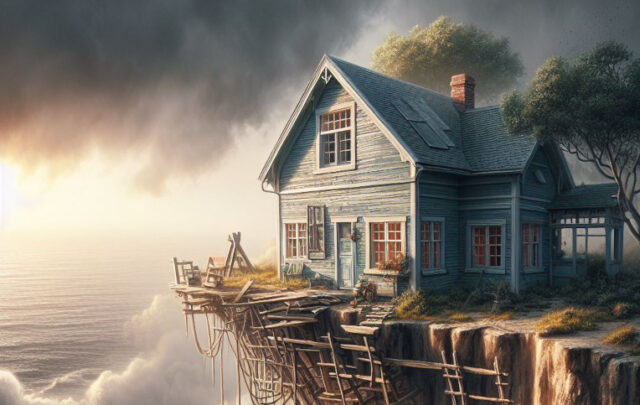My intention was to banish the mold from my basement, complete with formal exorcism ritual, before the Blueberry Moon went dark (14 September at 9:40pm, for those keeping track). That did not happen. Well into the new Harvest Moon, the Dumpster is still squatting in my driveway to be picked up later today. But the moldy stuff is, at last, out of my basement.
This was a heartbreaking endeavor, not least because many of these books have been with me for my entire life. Some were responsible for my life trajectory, such as it is. The sum of them tracked changes and mapped my interests and served as a fairly decent definition of who I am. So this was an intimate battle, complete with dark forces arrayed against my personal integrity. (I might be dramatizing… a little…)
This was also My Project, my baby, the thing I set out to do for myself and for the future. I was intentionally building a reference library that might preserve needed information for a time when YouTube videos and Wikipedia were no longer ubiquitous (which is already true in many places on this planet). The books in the basement were on science and craft of all kinds, but mostly related to home-scale production of needs. The science books were, admittedly, old and skewed toward the esoterica of geochemistry, so maybe not all that useful to a future without mass spectrometers. But I also kept all the books on weather and climate in that section, and those are useful, even now as we plunge into a 1.5°C warmer world. The craft books are simply irreplaceable. I had to work hard to find many of them, digging through bibliographies and chasing rumors through e-bay and used bookstores. Fortunately, most of them survived, but for the moment they are homeless, boxed up and waiting for some future that might include better book storage space.
This house is not that space. I’d like to think that this summer is an anomaly, that I won’t be living in a temperate rain forest — with snow — for the rest of my life. But I don’t even know what anomaly means with respect to weather these days. That word seems to have been shorn of all significance in this rising chaos. Furthermore, this flood is not all that unusual even with respect to the past. One of the people charged with cleaning up the mess made of my work-space was recording a video of the damages. As she panned over a toppled full-sized refrigerator and thousands of literal dollars covered in muck and computers festooned in rivulets of silt, she sighed deeply and moaned, “I don’t want to do another flood”. Because this is her third. None of that destroyed stuff was older than Hurricane Irene in 2011. Flooding has wiped out the valley towns in central Vermont repeatedly for as long as people have been building things next to the rivers. So this happens. This is not abnormal. The only change is that it is happening more frequently now.
Perhaps another change is the duration of weather patterns. Gone are the days when you might have drizzling rain by day, ending in a nightfall glittering with stars. Weather is sticky now. In Vermont it is sticky in actuality as well as metaphorically. We have had perhaps ten days without rain since the end of June. It has been the same sticky humidity and drizzle, punctuated by torrents now and again, day after day after day. Once a weather patterns sets up, it stays for months. This is true everywhere, not just Vermont. We just happened to get the wet weather. The strongest weather pattern, and probably the system that is driving everything else on the North American continent, is the heat dome that has been parked over the Southwest since… May? April? I can’t even remember when it started. But it’s been cooking Arizona and Texas and Southern California for months, diverting the jet stream and blocking moisture from the Pacific and the Gulf of Mexico. The central parts of the continent are dry and uncomfortably warm (though not “third degree burns from the pavement” warm), and most of the Atlantic Coast is very wet. (Not sure what’s going on in the Pacific Northwest… seems Vermont and Vancouver have traded climates.)
In any case, I can expect a flooded garage, a moldy basement, and weeks of cleaning up muck at work — wherever I work — to come along periodically for as long as I live here. Maybe not every summer. (I hope not every summer!!!) But enough to substantially interfere with book storage. Or, I guess, storage of anything that is food for fungi — and, after reading Merlin Sheldrake’s Entangled Life, I’m pretty sure that includes everything. (For a visceral visual of how my basement felt this past week, click on that link…)
So my library project is not going to work here. I am not ruling out moving to a place that might be less flood-prone and more water-tight, but I’m probably not going to find a house that I can afford that has dry space for thousands of books. Also, I probably can’t afford to replace the hundreds that I had to toss in the Dumpster last week, even if I could find those titles again. (And some were signed personally to me or my bookstore… so…) Anyway, I find that I don’t want to be the caretaker of this home library collection anymore. I don’t want to have it weighing down my life. And I know my sons don’t want to deal with it. So how is it going to get to people in the future?
I had thought about that before the flood and not come up with any answers. At best I had vague hopes of finding a library that would take it all, that I could build this collection and hand it over. For the record, I did call around to many schools and libraries. None of them takes large volumes of books, not even for their book sale fundraisers, never mind as intact collections of books to be stored. Furthermore, all of them require donations to be by appointment, and since the flood, there are few appointments… But, speaking more generally, I don’t know that libraries are traveling on a sustainable path these days. That’s why I started building my collection in the first place. As libraries are focusing on being third spaces, making physical and budgetary space for meeting rooms and public-use computers and play areas, there is less room for books. Even the library-of-things is getting more room than the library-of-reference materials.
Don’t get me wrong, I love all those things — libraries of things, public meeting rooms and performance spaces, free romper rooms for kids to play while parents read and gossip. I love that there are knitting clubs and poetry slams in my library. Only… I’d like to be able to find poetry books and obscure knitting patterns somewhere also, and that seems more like a library’s core function. Furthermore, while the knitting groups are better places to learn about knitting than books and YouTube videos, many of us can’t make it to the gatherings, which often happen in the middle of a weekday when most people my age are at work. People like me need books, so we can read and learn in our free time at home. That’s the whole point of books, portable information in a durable format. So we need actual libraries, places where the books are stored, as much or more than we need third spaces and libraries of things.
So I started building an actual library. I had a head-start with the inventory from my store that I couldn’t or didn’t return to publishers when the store closed. My store was unusual in that it had a broad selection of non-fiction, deeper in some topics than others, but still comprehensive. As I defined “kids’ books” to include anything necessary or helpful to schooling, I stocked adult-comprehension texts right alongside the picture books. I took that idea — and many of the books — as the kernel of my library building project.
It should be noted that nearly all booksellers really want to be library curators. Few of those that I’ve known actually wanted to sell the books on their shelves. We work hard at finding those titles, carefully adding to collections of arcane rarities and literary gems. More than one bookseller I’ve known kept piles of books in dark spaces under the counter or up on high shelves, hidden away from the eyes of the acquisitive mob. (Waiting for just the right customer…) So I guess I had this project in me already, long before I set any intentions.
But once started, it just grew and grew and grew. There are always more books. And they all seem important. Or at least interesting. Fiction is particularly hard to contain, but at least those books are still available at actual libraries and I could reasonably pass on buying them for my own collection. You may be on a nine-month waiting list, but you can check out most fiction from the public library. This is not as true of non-fiction, which, I think, is the more important use of book printing. This is the information that needs to be stored. Fiction is the stories that we tell each other, absolutely necessary stories perhaps, but still books that rarely outlast one reading. I’m going to be a literary apostate here and say that we don’t need to store most printed fiction. We do need to store printed ideas — and that is where the fiction that does take more than one reading fits into the collection. But more than stories, we need reference and instruction. Teaching tools and guides. Portals to experiences that we will never have. Books about our world and how to live in it. Libraries should be built on these long-lived books, with a window-dressing of novel best-selling fiction for light entertainment.
It seems to me that current libraries are mostly the exact opposite. There are whole rooms of fiction, mostly recent, mostly popular. There are bookcases of videos and music and computer games. There may be a few shelves devoted to self-help or history or travel books, depending on the tastes of the acquisitions librarian. There may even be a how-to book section, usually in the kid’s department. But it is a rare library that stores a deep selection of books that don’t get checked out regularly, and most non-fiction falls into that category. (You don’t need that book on plumbing hacks until you do…) In short, libraries are not libraries these days, but another source of popular entertainment. Which is good and necessary! But… not really a library… Our culture makes Wikipedia and YouTube the library while the library is turning into mediated amusement. And our culture is not going to be able to sustain those tech medias into an age of increasing chaos and decreasing energy and resources.
So I sought to be a library. (Yes, I bought that book on plumbing hacks.) But it is a project that is really beyond my means. Certainly, it is not a private project. It is useless for me to have a basement full of books that nobody else can access, no matter how worthy the collection. This is why libraries were invented, after all. Philosophers and monks and erudite nobility got tired of letting in the scholarly rabble and donated all their scrolls to schools. (Usually after they died, of course…) This project of library building is best done by a real library. (Duh…) At the least, there needs to be dry space in a more or less fire-proof building. The books need to be publicly accessible. The selection should include everything, not just what is popular. In fact, the popular stuff might be only a small part of the collection kept in the front while the main collections are stacks of warehoused information in dark back rooms.
This sort of thing needs its own space. It also needs its own budget. I would like to think that I could dedicate my financial resources to building a library, but then practicality rears its moldy head and I find that I can’t be a book warehouse. I don’t have the money or the right space. (And I don’t want the rabble in my basement, scholarly or not…) As we head into times where we need to learn and relearn many things, we need public libraries. We need third spaces also, but we need libraries to be libraries. And we need to support all these public enterprises.
This is what taxes should be used for — money to buy public good. (Instead, we use taxes to buy public evil like violence and graft.) Booksellers don’t want to sell books, they want to be able to collect books for people to use and bring back. So make all bookstores into libraries, non-profit institutions that warehouse information on durable media. And give those stores — note that word! — public funding to maintain their collections.
Of course, this would make it very hard to make money off of writing, printing and publishing books. A library only needs one or maybe two copies of a text, whereas my usual initial order for a new teen paranormal romance was a dozen books. I sold hundreds of Harry Potter books every year, thousands when the books were new. Bestseller is only a function of sales, after all…
But I’m not sure that this reduction in profit would be a bad thing. There is quite a lot of unwanted crap peddled out of every bookstore, much of which goes back to the publisher and then returns to the store as “bargain books” which eventually end up in landfills. Quite a lot of carbon packed into every mass market title. And usually, the books that a library — or a bookseller — would want to stock — those plumbing hack tips and knitting patterns and rare historical tidbits — are lost in the mess. There is no space for them on the shelves, but also no space in printing and promotional budgets, and so it’s hard to even find them in publisher lists. And that’s if you are intentionally looking.
Still, publishing would be a much smaller industry. I suspect it would also be spread out more, with writers and publishers in every region, not concentrated in New York and London. This, too, might have its benefits. In most regions, there might actually be more books produced on local history and gardening — and plumbing — than there are today. There might more applicable information available to more people if publishing was public-focused rather than profit-driven. More locally interesting entertainment as well, I imagine. I’d very much like for kids in rural Kansas or Idaho to be able to read story books that mirror their experiences, rather than those of an East Coast urbanite. (Or an imagined rural setting from the mind of an East Coast urbanite.)
But those East Coast urbanites make quite a lot of profit in this current system. They’re not just going to stop… As in many systems that need changing to better serve needs and to survive into a changing world, change is not going to come from within the established system. Local communities need to step up and make that change happen. However, unlike many necessary changes, in this case there already is a public library system. There are libraries in just about every community. There are bookstores too. All a community needs to do is move the third space needs into better suited community spaces and put books back into the library. Maybe combine the bookstore and library collections and use the former shops as community spaces. Or spread it all out in many combined spaces. But make space for the plumbing hacks books as well as the entertainment.
Make no mistake, as more communities take ownership of their lives, the centralized systems will fall apart. This may result in loss of some things. But it will also create local gains in many ways. If Penguin Random House is no longer selling All The Books, then there will be room for local people to step up and make literature. It may not be great literature at first, but it will be what the community wants and supports. And eventually, each community will refine its own production.
This is true for more than books, by the way. You could make this argument for public goods generally, for all things, especially the things we all most need like food and clothing. As in Ursula K Le Guin’s The Dispossessed, there could be stores that supplied public needs rather than shops that sold private possessions. There would be local libraries of everything durable. There would be no need of private collections of stuff, warehoused for a future that might need it. There would be public production of stuff for the present that uses it. Now, Ursula did have qualms about her world of un-possession — later editions were subtitled “An Ambiguous Utopia”. So I’m sure there are kinks to work out. But I’m also sure that humans could manage those kinks. I’m also fairly sure that in a world of increasing disaster and decreasing resources, some degree of public provisioning and a whole lot of localizing of every need will be necessary. So there will be incentives to work out those kinks. This is how we will live if we live at all.
As I’m recovering from mold recovery this week, I’m not as convinced that we will get to that future of public good. I don’t know that we have time or resources or stamina left. Seems to me that we’re going to be fully occupied in basic survival and clean-up for the next many centuries. It takes quite a lot of energy to get the mold out of the basement. What happens when we can’t just rent a Dumpster and have it hauled away? So I’m a bit depressed, and I don’t know what I’m going to do about the unhoused craft books.
But I’m sure I’ll recover. And I’m fairly sure that my library will find a home someday.
Note that, even though I had an enormous Dumpster filling up my driveway and plenty of reason to just toss everything, I did not throw out all the books…





